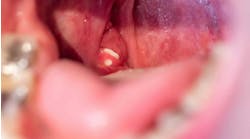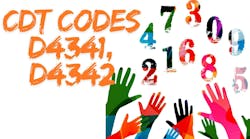Hygienists are taking their love of the profession to new heights by volunteering their services at home - and far away.
by Joanne Iannone Sheehan, RDH
During his State of the Union address last January, President Bush asked every American to dedicate at least 4,000 hours (roughly two years) to volunteer service. The president said, "For too long our culture has said, 'If it feels good, do it. America is embracing a new ethic and a new creed: 'Let's roll.' We want to be a nation that serves goals larger than self."
Linda Belaus, RDH, maintains a clearinghouse of volunteer opportunities on her Web site
Several organizations and Web sites are devoted to the dental needs of their fellow human beings. I interviewed a few of them with the hope that the rest of us will catch the spirit. The questions when considering volunteerism are: What do you love more - your paycheck or your profession? And, more importantly, can you go without a paycheck for a short while without dire consequences?
The Internet is a wonderful tool for increasing our opportunities to help others. Linda Belaus, RDH, of Sacramento, Calif., has spent untold hours upgrading her Web site to an all-inclusive information directory. As of this spring, Belaus' site, www.dentaljobs.net, is devoting a page to those who love their profession so much that they volunteer their services.
"Most of what is on the Web site is a result of suggestions from people in the dental field. The volunteer page came about as a result of an email from University of San Francisco dental hygiene students," explained Ms. Belaus. "They wanted to volunteer somewhere during the summer and asked for information on places where they might do that. So I posted a request on my Web site for names of organizations that might need volunteers and have received many responses. I've also gotten emails from tons of people saying they want to volunteer somewhere. Now they will be able to choose."
The list of volunteer groups for hygienists is growing daily on Linda's Web site. The Good Samaritan House has a dental clinic in San Mateo, Calif., where a hygienist can volunteer one day a month or more. The Los Angeles Free Clinic is another organization whose needs are listed on www.dentaljobs.net. Other institutions have dental equipment but need volunteers to provide treatment.
Margaret Kolthammer, RDH, who serves with Dental Volunteers of Israel, an organization meeting the oral-health needs of low-income children of all faiths in Jerusalem.
If you want to be more adventurous, there are opportunities abroad. Imagine practicing in Bolivia, Cambodia, Costa Rica, Nepal, the Philippines, the South Pacific , Tibet, Zambia, Honduras, Kosovo, Israel, or Costa Rica. One thing is certain - people need dental treatment no matter where they live - whether they can afford it or not.
What makes a dental professional forego a paycheck and volunteer.? Most cite the sheer satisfaction that comes from achieving a positive change, helping those in need, and the opportunity to be a hero. Requests come in from around the world for hygienists to provide their much-appreciated services.
"One hygienist volunteers at an animal shelter and asked if I knew someone who would donate a used ultrasonic scaler. I contacted doctors and staff in that county and asked for a donation," Belaus said. "I got an email from an instructor at the College of Marin where I graduated in 1964 from a dental assisting program. She had a 75- year-old dental assisting student who enrolled in the program so she could go to Guatemala and provide dental care to those in need. This could be such a rewarding experience, to be able to help, and to offer our time, talents, experience, and expertise to those who wouldn't get it otherwise."
Carol Griffin, RDH, and president of the Georgia Dental Hygienist's Association, is very pleased with the response she's received from her colleagues. Five months ago, she posted a request for volunteers on the GDHA Web site to start an RDH volunteer network to perform oral screenings. As of March 5, GDHA has enlisted approximately 65 hygienists across the state willing to donate their skills for their fellow Georgians.
Dentists and hygienists from all over the world volunteer their time and expertise in war-torn Jerusalem as part of Dental Volunteers of Israel, a group dedicated to providing care to low-income children of all faiths.
"I had hoped for a big response," Griffin told me. "Sixty-five is great! Not all of these replies came from the Internet. Most have been from meetings that I have personally attended where I talked about the network. They signed up on the spot. GDHA has also put information in our newsletter, The Flossline. It is a great start, but I am hoping to double that number."
The Georgia legislature recently allowed hygienists to practice with more autonomy. "How exciting for hygienists in Georgia to have had this legislation passed that allows us to do oral screenings without the dentist present," Griffin said. "It may seem like a baby step, but it has received a giant response from dental hygienists all over our state!" Griffin has had such a good response that she now manages the information by geographical areas and delegates authority to maximize effectiveness.
"I am in the process of organizing the data by regions and establishing a captain for each area. They can put together phone trees or email lists so one person is not doing all of the contacting," she explain. "In providing a visual assessment of the oral cavity in a nonthreatening environment (schools, health fairs, hospitals, etc.), we can communicate the need to seek dental care. On March 6, we participated in a health fair at the Georgia State Capitol, sponsored by the National Commission on Men's Health," she continues. "We had seven hygienists there to do the oral screenings. The public response was terrific. We have already been invited by the legislators to participate at next year's event. I consider that an honor for dental hygienists in Georgia." You can contact Ms. Griffin through the GDHA Web site at www.gdha.org.
Colleen Beasley, RDH, works four days a week with Dr. Adrian Ferguson, a volunteer for Flying Doctors, Inc., an organization dedicated to the dental needs of the people of northern Mexico. However, Beasley herself chooses to focus her efforts locally. For 10 years, she's performed screenings at the Napa Valley Children's Center, a preschool program for mostly low-income families. She also teaches dental health to kindergarten and first-graders, encouraging them about the importance regular dental visits and good nutrition.
"Going into the classroom is really fun and the kids are so responsive to the information. Teachers really appreciate the efforts, and the kids like the goodies we hand out," she said.
Beasely emphasizes that for those hygienists seeking an international experience, Flying Doctors is a great cause. Contact them at www.flyingdocs.org or www.fendersondds.com.
Northwest Medical Teams is a Christian organization based in Portland, Ore., whose mission is to provide free or low-cost dental care in the Pacific Northwest. In 1989, Northwest Medical Teams employed its first mobile dental clinic to treat needy families. Today, the organization treats more than 17,000 people in 26 Pacific Northwest counties. Dick Roland, vice president of the Mobile Health Care Program, states that the value of services equals more than $2.5 million each year. Hygienists are needed for the almost daily clinics these mobile units offer.
Development Dental Teams, a growing element of Northwest Medical Team's outreach, works in eight countries, including Bosnia, El Salvador, Honduras, Mexico, Moldova, Romania, Serbia and the Ukraine. This organization's partnership with local agencies provides much needed dental care in a variety of locations, such as clinics, primitive shelters, Bible Clubs, churches, hospitals, and orphanages. The team consists of dentists, hygienists, and assistants. Every team member is licensed or certified. The organization supplies portable compressors, dental units, chairs, handpieces, and even luggage. Volunteers usually pay their own plane fare, lodging, food, and translators.
Pauline Stuedli, RDH of Klamath Falls, Ore. has worked closely with this organization for more than 10 years. Stuedli and her husband, Ed, a dentist, taught at the Oregon Institute of Technology. They often flew to Matapalo, Costa Rica with some of their students to treat patients. It was such a rewarding experience that after retirement, the Stuedlis decided they wanted to volunteer full-time.
"Every time we come back from Moldova, Romania, or El Salvador, I realize how much we have here in the United States. When we travel, we see government oppression, no resources or access to care ... some of these people see a doctor or dentist once in their lives if they're fortunate. And, where they do have a dentist, the children aren't treated until about age 12 because they believe the baby teeth are going to fall out anyway, so why bother. People learn to live with constant toothaches. I've seen where abscesses have been lanced extraorally. We feel we've really been able to make a difference in these people's lives," Ms. Stuedli said. "The Lord has blessed us abundantly."
Pauline Stuedli, RDH, and her husband, Ed Stuedli, DDS, volunteer full-time for Northwest Medical Teams mobile health care unit, providing dental care for patients with no access to dentistry otherwise.
Stuedli tells of one elderly lady who was in constant pain and supposedly dying of cancer in Moldova, a small country near Romania. Due to the poor condition of her teeth, the patient could barely eat. Dr. Stuedli performed much-needed dental work; when they returned the following year, the patient was thriving!
Currently, the Stuedlis travel in a mobile unit four days a week to four communities in Klamath County and treat patients with no access or no insurance. The need for dental care in these areas far exceeds even their worst expectations. Some conditions the Stuedlis see are worse than those in Third World countries where they have provided care. There is a great need for volunteer dentists and hygienists in these areas due to the shortage of dentists in rural areas. To find out more about Northwest Medical Teams, contact Georgene Burnett at (800) 959-4325, or visit their Web site at www.nwmed icalteams.org.
Hygienists can serve their communities in other, nonclinical ways. Former ADHA president Maria Perno Goldie,RDH, BA. MS,. volunteers as a board member of the Dental Health Foundation (DHF). Education is a large part of our jobs as hygienists and Goldie's mission has been to educate the public, making them aware of developments in dental health as a segment of overall health. As part of her involvement with the DHF, she presented testimony on the National Oral Health Plan in San Diego, Calif.
Goldie recently spoke to a group of consumer advocates, perinatal, dental, and other providers about the new Medi-Cal dental benefits for pregnant women. Although the DHS was still preparing details on implementation, Goldie had important information about the new benefit and how it affected providers. Some other pro bono services Goldie provides on a national level include her involvement on the Advisory Board of the National Women's Health Resource Center, reviewing articles and content for their Web site, and teaching CPR through the American Heart Association and the Red Cross. She can be reached at [email protected] or www.seminarsforwomenshealth.com.
One hygienist who has an inspiring thirst for service and adventure is Margaret Kolthammer, RDH, of Abbotsford, B.C. Kolthammer schedules her own volunteer trips independently. A graduate of the University of British Columbia's dental hygiene program in 1976, she has traveled all over the globe practicing hygiene and basically being of service in any way possible.
"It is the grace and provision of God that allows me to volunteer," Kolthammer states, "And also my desire to do His will."
Kolthammer has met the challenges of hurricanes, political unrest, and uncertainty in her quest to serve. In 1995, she went to Haiti as the U.N. peacekeepers replaced the American troops. For two weeks, she worked tirelessly, spending time in the dental clinic and on a missionary's back porch treating patients with an aversion to dental clinics. While there, she was also involved in a small building project. In 1999, she helped build church congregations with Church Partnership Evangelism in India. For six months in 2000, she acted as pharmacist, clinic assistant, secretary, and transporter of people and supplies for the Pacific Academy Outreach Society at the Kibaale Children's Centre in Uganda.
Then, in November 2001, Kolthammer went to Jerusalem and worked with the Dental Volunteers for Israel (www.dental-dvi.co.il) at a clinic set up by Trudi Birger, a Holocaust survivor. This establishment was created to provide free dental care to poor children of any faith ages five to 18 who are referred by the city's Social Service Department. Kolthammer volunteered for three weeks and had another three weeks to tour Israel. But with an 80 percent drop in tourism, she did most of her sightseeing alone. While many dentists cancelled their trips to Israel because of the current unrest, the tensions did not deter Kolthammer. She paid her own airfare (tax- deductible in the United States and Canada) and stayed at an apartment provided by DVI. Working at the clinic four days a week, Kolthammer had a new international boss every Sunday, their first day of the week.
The clinic staff was impressed with her efficiency and ability to write her patient's names in Hebrew on the production record. Kolthammer described how the clinic grieved en masse after a suicide bomber killed 11 teenagers and wounded more than 100 others. At noon, there was another bombing in Haifa, then a shooting in the Muslim Quarter of the Old City. But life continued at Dental Volunteers for Israel. The children were still treated and lectured on brushing "three times a day, like a good Jew prays." Margaret left the clinic that day and went to the Ophel gardens and the steps that climb to the southern wall of the Temple Mount. Overlooking Gethsemane and the Mount of Olives, she reflected on the way things were and prayed for peace in Jerusalem.
Today, Kolthammer works as a contract relief hygienist in British Columbia, helping out wherever she can. "The pay allows me to maintain my lifestyle, support others around the world, and seek service opportunities," she relates.
Our profession can also be a ministry. A paycheck does not guarantee job satisfaction. If you feel you need a change, to serve for a time where you're desperately needed and appreciated ... if you say you love the humanitarian aspect of dental hygiene, then ask yourself: How much do you love it?
Joanne Iannone Sheehan, RDH, is a frequent contributor to RDH and is based in Huntsville, Alabama. She can be contacted at [email protected].













